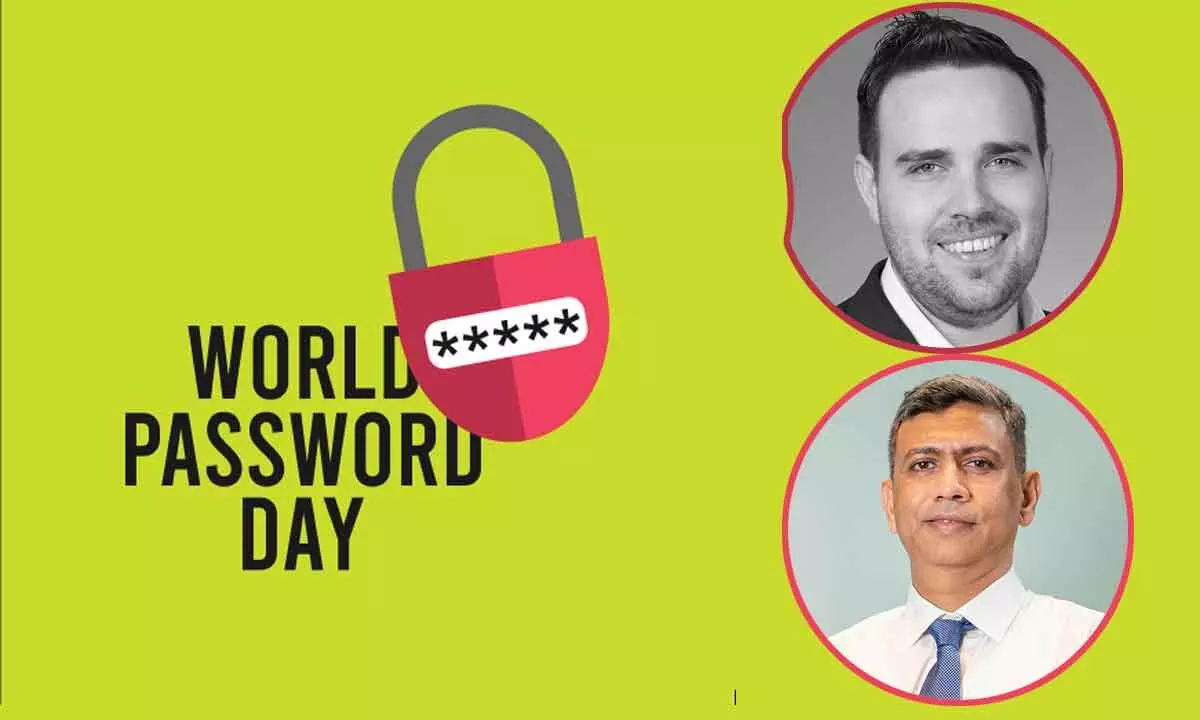Live
- Poonch terror attack: Security forces release sketches of two terrorists
- Constituency Watch: For BJP it’s fight for consolidation while Congress sees an opportunity to regain past glory in Nandurbar
- Congress, BRS, AIMIM following Muslim League agenda: J P Nadda
- PeopleStrong, Google Cloud join hands to transform employee experience with AI
- Siguler Guff invest Rs 240 crore in Hyderabad-based microfinance lender Spandana Sphoorty
- 'BJP CM will take oath in Odisha on June 10', roars PM Modi at Berhampur rally
- Five-year-old boy found dead after being swept away in Texas floodwaters
- Akhilesh appoints Shyam Lal Pal as new state president of SP
- Manipur: Educational institutions close for two days after heavy rains, hailstorm
- End of BJD rule on June 4, says Modi
Just In
World Password Day 2024: History and Tips from Experts for Secure Passwords


World Password Day, observed on May 2, emphasizes the importance of strong passwords in safeguarding personal and financial information.
World Password Day 2024 falls on Thursday, May 2, marking the annual observance dedicated to promoting awareness about the significance of using secure passwords. The day serves as a reminder of the critical role passwords play in protecting personal data and financial information from unauthorized access.
Passwords act as the first line of defense against cyber threats, guarding sensitive accounts such as social media platforms and bank accounts. It is essential to create strong passwords and regularly update them to mitigate the risk of hacking and identity theft.
To celebrate World Password Day, individuals are encouraged to educate themselves and others about the importance of password security. This includes setting strong passwords with a combination of letters, numbers, and symbols, as well as utilizing two-factor authentication where possible. By promoting awareness and best practices in password management, we can enhance cybersecurity and protect digital identities.
The Hans India brings tips from industry experts on this day:
Rohan Vaidya, Area Vice President - India & SAARC, CyberArk
Rohan Vaidya, Area Vice President - India & SAARC, CyberArk says as we observe World Password Day, the need to rethink online security in India becomes more pressing. The country faces a rising threat of sophisticated cyber-attacks, making it crucial to consider alternatives to passwords. Getting rid of passwords significantly lowers the risk of account breaches, offering strong protection against common threats like phishing and keylogging. This not only keeps user identities safe but also simplifies the user experience by removing complex password requirements and frequent updates. Moreover, switching to passwordless authentication boosts efficiency by doing away with password-related IT support tasks such as regular resets. As a result, organizations are increasingly prioritizing Identity and Access Management (IAM) as a key part of their cybersecurity strategy, integrating passwordless authentication for secure access via biometric and possession-based methods.
However, transitioning to a passwordless system faces challenges, especially in managing complex IT infrastructures and outdated systems. Businesses struggle with infrastructures that involve many users, applications, and hybrid or multi-cloud setups. IAM comes to the rescue here, making passwordless endpoint authentication easier and facilitating the transition. Innovative methods like passkeys, which use the security features of multiple devices, offer a promising solution. Passkeys not only address vulnerabilities in traditional password-based systems but also enhance security by reducing the risk of phishing attacks. In India's rapidly evolving digital landscape, these advancements are essential for safeguarding sensitive data and ensuring excellent user experiences.
Tyler Moffitt, Sr. Security Analys, OpenText Cybersecurity
Over the years, we've observed a significant shift in how cybercriminals exploit password vulnerabilities. Initially dominated by brute force attacks, which rely on computational power to guess passwords, the landscape has shifted towards more sophisticated methods. However, it's important to note that brute force attacks remain relevant due to advancements in technology. The increase in GPU power has made these types of attacks more feasible, allowing cybercriminals to crack passwords faster than ever before. This persistence, along with a rise in phishing attacks and credential stuffing, where attackers exploit poor password hygiene and use previously breached data to access new systems, highlight the need for robust password policies and advanced security measures.
To combat the sophistication of these threats, it's vital to adopt a layered security approach:
- Strengthen Password Policies: Implement policies that require longer, complex passwords that are difficult to guess or crack.
- Promote the Use of Password Managers: Encourage users to adopt password managers to generate and store unique, robust passwords for every account.
- Expand Multi-Factor Authentication (MFA) Adoption: Push for broader use of robust MFA techniques, particularly those that employ physical or biometric factors, which provide higher security than knowledge-based factors. Hardware tokens or biometric verification are far superior to SMS or email-based verification, which remain susceptible to interception and manipulation techniques like SIM swapping.
- Educate and Train Users: Regularly educate users about the importance of password security and the latest phishing tactics, to reduce the risk of social engineering attacks.

© 2024 Hyderabad Media House Limited/The Hans India. All rights reserved. Powered by hocalwire.com






